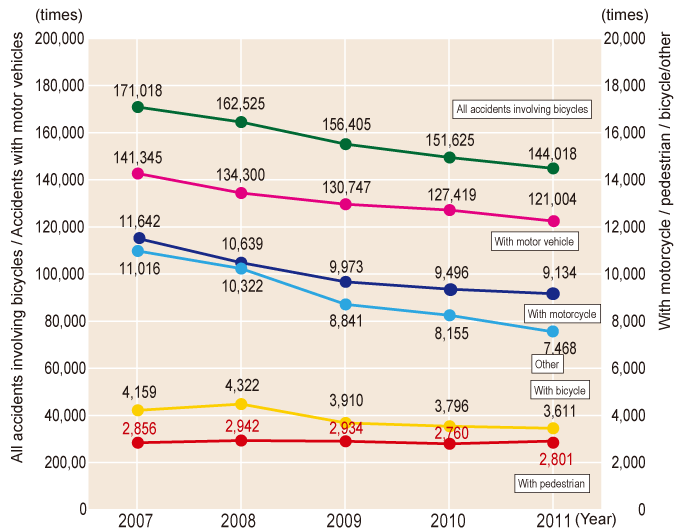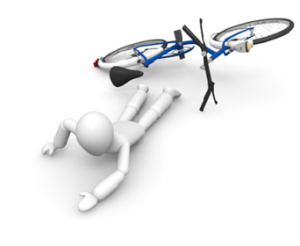Cycling Safety:Traffic accidents involving bicycles in Japan
Cycling related accidents
While bicycles play an important role in Japan as a convenient transportation method, there has been an increase of bicycle accidents relative to the total number of traffic accidents.
According to National Police Agency of Japan, while bicycle related accidents are actually falling (109,269 in 2015 down from 188,338 in 2014 nationally), the ratio of fatal accidents to the whole rose to 13.5 % over the same period. In Tokyo alone, about 11,000 cyclists still had accidents, with 33 losing their lives in 2015. Because of this, the Traffic Safety Committee in Tokyo are considering to introduce further measures to prevent accidents and curb fatalities such as making helmet use to be mandatory.

Bicycle related traffic accidents
Note: "Accidents involving bicycles" means the first party or the second party is a bicyclist and accidents between two or more bicyclists are calculated as one instance.
Source: Information from National Police Agency
To stop this trend, the National Police Agency (NPA) and MLIT cooperated to formulate 'Guideline for Creating a Safe & Comfortable Bicycle Use Environment'.
Cycling Rules and Regulations
When cycling in Japan, certain rules and regulations cyclists from overseas may not be aware of come into play. First and foremost, all bicycles must have a working front lamp and reflector at the rear. Also bells are a legal requirement but this is not enforced, and conflicting reports from authorities in Japan even mention that using a bell on the pedestrian footpath is illegal. Please refer to our article about traffiic rules for further information, also there is an article about Japanese traffic signs that may be useful.
Necessary Registration
Insurance for cyclists is not legally required, but like all vehicles, bicycles must be registered with local authorities. This cost just 500 yen and can be done when purchasing your bike in a bike shop. You can simply fill out a form and the shop staff will be able to issue you a small sticker to be displayed on your bike. You will most likely have to write your name and address in Japanese, so bring a helpful friend if you are unable to do that yourself, or ask the shop staff to do this for you.
Foreign residents or visitors should also make sure they always have a passport or ID issued by Japanese government. The police can stop cyclists to check ownership of appropriate documents and carrying these at all times is a legal requirement for non-Japanese.
Japanese Car Drivers
Japanese car drivers are generally courteous, but do not assume all motorists on the road are well mannered and observant. Also note that motorists in Japan are used to slower bicycles (so called 'mama-chari') and may under-estimate your speed if you are riding a road bike at full speed. Pay extra attention at intersections, driveways and other spots where motorists may not be able to see you. Wherever possible, use hand signals when turning, slowing down or stopping.

